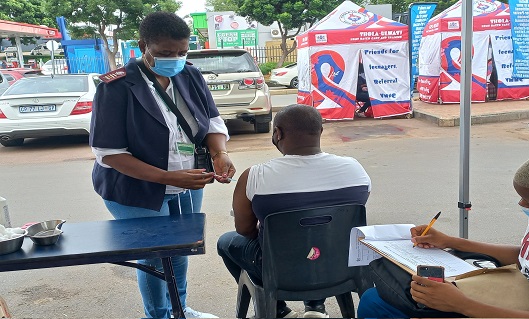Office of the Premier 2021/12/09 - 22:00

Thembisa Shologu
South African scientists are conduction high-quality research to better understand the new COVID-19 variant, Omicron, including how well it transmits and whether it can escape immunity.
Omicron was first reported by South Africa, Botswana and Hong Kong and has been classified as a Variant of Concern by the World Health Organization (WHO).
As at 8 December, 42 countries in six WHO regions had reported the variant with many countries reporting sustained community spread.
Here at home, Omicron has driven a resurgence in COVID-19 cases, with 89 651 cases reported nationally from 7 November to 4 December 2021.
Weekly cases in Gauteng province have increased by 415% for the week ending 4 December 2021 compared to the previous week, while hospital admissions rose 204%.
"Understanding the level of severity of the Omicron variant will take several weeks. Our hospital surveillance has demonstrated that patients still do experience the full spectrum of the disease- from mild to severe disease," says Health Minister, Joe Phaahla.
Current vaccines have shown to be effective in protecting against severe diseases as 70% of those admitted to the country's hospitals are those who are unvaccinated.
"COVID-19 vaccines have been shown to protect against severe diseases with the previous variants, and it is expected that such effectiveness will be maintained against Omicron.
"Early studies have revealed that there is only some loss in the protection of the Pfizer vaccine against Omicron," said Phaahla during his weekly media update.
From 14 November to 4 December 2021, there has been an increase in admission among children under five years, as recorded in the Tshwane Metro hospitals.
"It is still not clear what is driving this apparent increase in the proportion of children admitted to hospital with COVID-19. Time and further investigations will provide some answers," said Phaahla.
He added that the children who are at risk for severe disease and death are those who are under one year, due to their immature immune system, and children with comorbid medical conditions such as premature birth, diabetes, cancers, HIV and TB.
The minister said there was a need for caution but not alarm.
"We expect the Omicron variant to behave in the same way as other variants when it comes to children. Children are less likely to be infected when exposed to the virus, less likely to be severely ill when infected with the virus and less likely to die when severely ill."
As at 1 December 2021, immunocompromised adults are eligible to receive a booster vaccine dose (either a third Pfizer dose or a second Janssen dose, as a homologous booster).
The South African Health Products Regulatory Authority (SAHPRA) has very recently announced that a Pfizer booster dose has been approved for all adults aged 18 years and older to be administered at least 6 months after the second dose.
Children 12 years and older are now eligible to receive two doses of the Pfizer vaccine, 42 days apart.
As at 10 December 2021, 7,3 million vaccinations have been administered, with 4.6 million people receiving one dose of either J&J or Pfizer and 3.9 million people have been fully vaccinated in Gauteng.
RELATED NEWS
No related news

